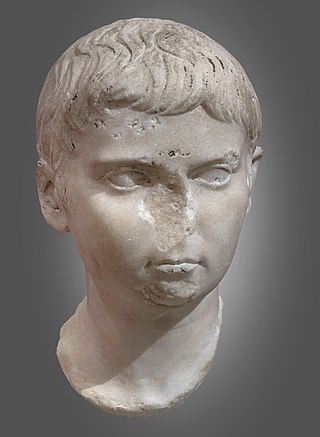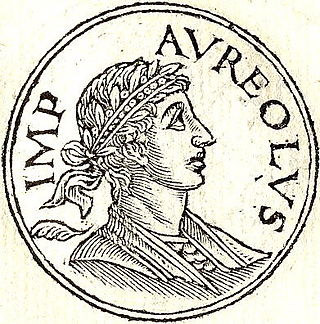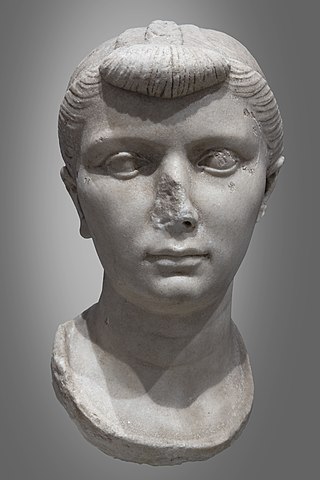Year 12 BC was either a common year starting on Saturday, Sunday or Monday or a leap year starting on Sunday of the Julian calendar and a common year starting on Friday of the Proleptic Julian calendar. At the time, it was known as the Year of the Consulship of Messalla and Quirinius. The denomination 12 BC for this year has been used since the early medieval period, when the Anno Domini calendar era became the prevalent method in Europe for naming years.
AD 4 was a common year starting on Wednesday or a leap year starting on Tuesday of the Julian calendar and a leap year starting on Tuesday of the Proleptic Julian calendar. In the Roman Empire, it was known as the Year of the Consulship of Catus and Saturninus. The denomination "AD 4" for this year has been used since the early medieval period, when the Anno Domini calendar era became the prevalent method in Europe for naming years.
This article concerns the period 19 BC – 10 BC.
Agrippina is an ancient Roman cognomen and a feminine given name. People with either the cognomen or the given name include:

Marcus Agrippa Postumus, later named Agrippa Julius Caesar, was a grandson of Roman Emperor Augustus. He was the youngest child of Marcus Vipsanius Agrippa and Julia the Elder. Augustus initially considered Postumus as a potential successor and formally adopted him as his heir, before banishing Postumus from Rome in AD 6 on account of his ferocia. In effect, though not in law, the action cancelled his adoption and virtually assured Tiberius' emplacement as Augustus' sole heir. Postumus was ultimately executed by his own guards shortly after Augustus' death in AD 14.

The Gallic Empire or the Gallic Roman Empire are names used in modern historiography for a breakaway part of the Roman Empire that functioned de facto as a separate state from 260 to 274. It originated during the Crisis of the Third Century, when a series of Roman military leaders and aristocrats declared themselves emperors and took control of Gaul and adjacent provinces without attempting to conquer Italy or otherwise seize the central Roman administrative apparatus.
The praenomen was a personal name chosen by the parents of a Roman child. It was first bestowed on the dies lustricus, the eighth day after the birth of a girl, or the ninth day after the birth of a boy. The praenomen would then be formally conferred a second time when girls married, or when boys assumed the toga virilis upon reaching manhood. Although it was the oldest of the tria nomina commonly used in Roman naming conventions, by the late republic, most praenomina were so common that most people were called by their praenomina only by family or close friends. For this reason, although they continued to be used, praenomina gradually disappeared from public records during imperial times. Although both men and women received praenomina, women's praenomina were frequently ignored, and they were gradually abandoned by many Roman families, though they continued to be used in some families and in the countryside.

Marcus Cassianius Latinius Postumus was a Roman commander of Batavian origin, who ruled as emperor of the splinter state of the Roman Empire known to modern historians as the Gallic Empire. The Roman army in Gaul threw off its allegiance to Gallienus around the year 260, and Postumus assumed the title and powers of Emperor in the provinces of Gaul, Germania, Britannia, and Hispania. He ruled for the better part of ten years before he was murdered by his own troops.

The gens Julia was one of the most prominent patrician families in ancient Rome. Members of the gens attained the highest dignities of the state in the earliest times of the Republic. The first of the family to obtain the consulship was Gaius Julius Iulus in 489 BC. The gens is perhaps best known, however, for Gaius Julius Caesar, the dictator and grand uncle of the emperor Augustus, through whom the name was passed to the so-called Julio-Claudian dynasty of the first century AD. The nomen Julius became very common in imperial times, as the descendants of persons enrolled as citizens under the early emperors began to make their mark in history.

Aureolus was a Roman military commander during the reign of Emperor Gallienus before he attempted to usurp the Roman Empire. After turning against Gallienus, Aureolus was killed during the political turmoil that surrounded the Emperor's assassination in a conspiracy orchestrated by his senior officers. Aureolus is known as one of the Thirty Tyrants and is referenced in ancient sources including the Historia Augusta, Zonaras' epitome and Zosimus' Historia Nova.

Lucius Caesar was a grandson of Augustus, the first Roman emperor. The son of Marcus Vipsanius Agrippa and Julia the Elder, Augustus' only daughter, Lucius was adopted by his grandfather along with his older brother, Gaius Caesar. As the emperor's adopted sons and joint-heirs to the Roman Empire, Lucius and Gaius had promising political and military careers. However, Lucius died of a sudden illness on 20 August 2 AD, in Massilia, Gaul, while traveling to meet the Roman army in Hispania. His brother Gaius also died at a relatively young age on 21 February 4 AD. The untimely loss of both heirs compelled Augustus to redraw the line of succession by adopting Lucius' younger brother, Agrippa Postumus as well as his stepson, Tiberius on 26 June 4 AD.

Vipsania Julia Agrippina nicknamed Julia Minor and called Julia the Younger by modern historians, was a Roman noblewoman of the Julio-Claudian dynasty. She was emperor Augustus' first granddaughter, being the first daughter and second child of Julia the Elder and her husband Marcus Vipsanius Agrippa. Along with her siblings, Julia was raised and educated by her maternal grandfather Augustus and her maternal step-grandmother Livia Drusilla. Just like her siblings, she played an important role in the dynastic plans of Augustus, but much like her mother, she was disgraced due to infidelity later on in her life.

Julia the Elder, known to her contemporaries as Julia Caesaris filia or Julia Augusti filia, was the daughter and only biological child of Augustus, the first Roman emperor, and his second wife, Scribonia. Julia was also stepsister and second wife of the Emperor Tiberius; maternal grandmother of the Emperor Caligula and the Empress Agrippina the Younger; grandmother-in-law of the Emperor Claudius; and maternal great-grandmother of the Emperor Nero. Her epithet "the Elder" distinguishes her from her daughter, Julia the Younger.
Gaius Fonteius Agrippa was the name of two related people in Roman history:
Vipsanius Clemens was an impostor in Ancient Rome who attempted to impersonate the Roman emperor Augustus' grandson Postumus Agrippa. He afterwards also became known as pseudo-Agrippa.
Agrippa is a Latin praenomen, or personal name, which was most common during the early centuries of the Roman Republic. It was sometimes abbreviated Agr., or occasionally Agripp.; both forms are found in the Fasti Capitolini. Despite ending in -a, it is a masculine name. The feminine form was probably Agrippina, which is also found as a cognomen, or surname, but no examples of its use as a praenomen have survived.
Postumus is a Latin praenomen, or personal name, which was most common during the early centuries of the Roman Republic. It gave rise to the patronymic gens Postumia, and later became a common cognomen, or surname. The feminine form is Postuma. The name was not regularly abbreviated, but is sometimes found as Pos. or Post.

The gens Vipsania or Vipsana was an obscure plebeian family of equestrian rank at ancient Rome. Few members of this gens appear in history, although a number are known from inscriptions. By far the most illustrious of the family was Marcus Vipsanius Agrippa, a close friend and adviser of Augustus, whom the emperor intended to make his heir. After Agrippa died, Augustus adopted his friend's sons, each of whom was considered a possible heir to the Empire, but when each of them died or proved unsuitable, Augustus chose another heir, the future emperor Tiberius.








